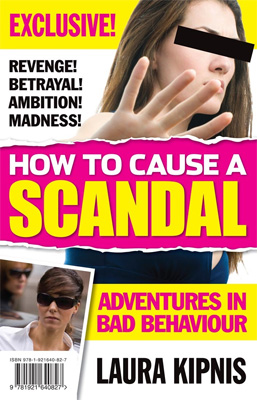How to Cause a Scandal: Adventures in Bad Behaviour

How to Cause a Scandal: Adventures in Bad Behaviour
We all relish a good scandal - the larger the figure (governor, judge) and more shocking the particulars (diapers, cigars), the better. But why do people feel compelled to act out their tangled psychodramas on the national stage, and why do we so enjoy watching them, hurling our condemnation while savouring every lurid detail?
With 'pointed daggers of prose' (The New Yorker), Laura Kipnis examines contemporary downfall sagas to lay bare our psyche: what we desire, what we punish, and what we disavow. She delivers virtuoso analyses of four paradigmatic cases: a lovelorn astronaut, an unhinged judge, a venomous whistle-blower, and an over-imaginative memoirist. The motifs are classic - revenge, betrayal, ambition, madness - and the pitfalls are ones we all negotiate daily. After all, every one of us is a potential scandal in the making: failed self-knowledge and colossal self-deception - the necessary ingredients - are our collective plight.
In How to Cause a Scandal, bad behaviour is the entry point for a brilliant cultural romp as well as an anti-civics lesson. 'Shove your rules', says scandal, and no doubt every upright citizen, deep within, cheers the transgression - as long as it's someone else's head on the block.
Laura Kipnis is the author of Against Love: a polemic and The Female Thing: dirt, sex, envy, vulnerability, which have been translated into 14 languages. She is a professor in the Department of Radio/TV/Film at Northwestern University, has received fellowships from the Guggenheim Foundation, the Rockefeller Foundation, and the National Endowment for the Arts, and has contributed to Slate, Harper's, The Nation, Playboy, and The New York Times Magazine. She lives in New York and Chicago.
How to Cause a Scandal: Adventures in Bad Behaviour
Scribe Publishing
Author: Laura Kipnis
ISBN: 9781921640827
Price: $29.95
Interview with Laura Kipnis
Question: Why did you originally decide to write How to Cause a Scandal: Adventures in Bad Behaviour?
Laura Kipnis: I was really trying to understand why I was so fascinated by these stories and followed them so closely, and what sort of nasty pleasure was involved-because they are so pleasurable.
Question: Can you tell us how How to Cause a Scandal: Adventures in Bad Behaviour examines bad behaviour, worldwide?
Laura Kipnis: It's not an attempt to do a cross-cultural survey which would be pretty impossible, but to describe the universal dynamics: transgression, expose', public shaming and humiliation... The specifics of the transgression shift from society to society, and historically of course. But someone's always breaking some taboo somewhere, which the rest of us take a certain pleasure in, even while hurling big rocks at them.
Question: Why do you think, everyone, loves a good scandal?
Laura Kipnis: It's a chance to moralise, of course. Socially speaking, these are like purity rituals: we cast out the transgressor, and then feel better about ourselves. There's an element of sadomasochism as well: they invite punishment and we provide it. So I see it as a complicated dynamic in which our role is as necessary as theirs.
Question: What has been your favourite celebrity scandal?
Laura Kipnis: Here's a link to something I wrote recently on the Tiger Woods scandal, which had a lot of great elements" www.slate.com.
But of course there's the Clinton scandal, which is probably my all time favorite. It changed the course of national-and international-history, as it can perhaps be blamed (at least indirectly) for the war in Iraq given how it affected the outcome of the next election. In the book I write about Linda Tripp, who played such a significant role in propelling it: one previously unknown woman betraying her girlfriend turns out to have worldwide consequences.
Question: Lastly; why do people feel compelled to act out their tangled psychodramas on the national stage?
Laura Kipnis: There's some inherent leakiness in the way we're put together I think; we're not built to keep secrets. One psychologist I quote calls it "the compulsion to confess." It's part of why we're so fascinated with each other's secrets, no doubt-as doesn't everyone have a few they'd fear to see exposed?
MORE



